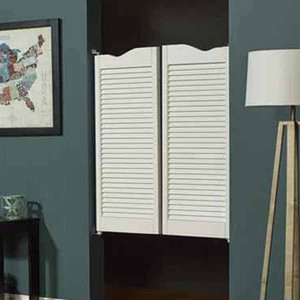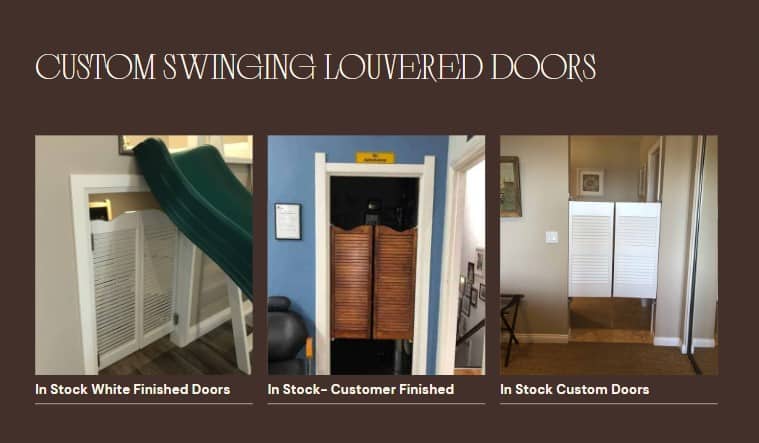
Advantages and Disadvantages of Interior Louvered Doors
Advantages and Disadvantages of Interior Louvered Doors
When it comes to the finer details of home design, even the smallest feature can make or break the ambiance of a space. Interior doors, often thought of as subtle backdrops, actually wield considerable influence over the energy, aesthetics, and utility of a room. Among the diverse array of interior door types, louvered doors have a distinct charm that marries functionality with a breezy, coastal-inspired aesthetic.
In this extensive exploration, we will delve into the attributes of louvered doors, providing exhaustive insights to help homeowners, renovation aficionados, and interior designers understand the practical and stylistic implications of choosing louvered doors for various living spaces. Let's open the door to understanding the full breadth of this unique interior design element.
Introduction
Louvered doors, characterized by their slatted panels, are a classic architectural feature that has reemerged with modern styling. Traditionally used to allow air to flow freely between rooms and from the outside, today's louvered doors serve a variety of purposes, adding a sense of openness while maintaining a degree of privacy.
The unique construction of louvered doors, with their effective use of negative space, ushers in an unrivaled sense of lightness to any room. Their concertina-like movement not only adds visual texture but also functional flair. However, with these aesthetic benefits come a few drawbacks that should be carefully considered in the design or renovation of your home.
Advantages of Interior Louvered Doors
 Let's shed light on the reasons discerning homeowners are choosing louvered doors, recognizing their advantages in today's diverse design contexts.
Let's shed light on the reasons discerning homeowners are choosing louvered doors, recognizing their advantages in today's diverse design contexts.
Improved Air Circulation and Ventilation
One of the most significant assets of louvered doors is their ability to promote natural airflow within the home. Unlike solid doors which can impede ventilation, the open design of louvered doors enables continuous air circulation, perfect for spaces that may tend to become stuffy or humid. In areas like laundry rooms, pantries, or closets, where air quality is essential, louvered doors provide a welcome solution.
Enhanced Privacy and Light Control
Despite their permeability to air, louvered doors still offer a level of privacy that is desirable in various living spaces. Their angled slats are adept at diffusing light, allowing a gentle luminosity to permeate a room without compromising privacy. Moreover, by adjusting the slats, one can modulate the level of light to create the perfect atmosphere.
Stylish and Modern Aesthetic
Interior louvered doors inject a touch of contemporary style into a living space while also resonating with a more traditional, coastal ambiance. The play of light and shadows through the slats, coupled with the seemingly weightless profile of the door, creates a chic, laid-back feel that can complement a range of design sensibilities, from Scandinavian to Mediterranean.
Space-saving Design
For those battling the constraints of space, louvered doors offer a significant advantage over traditional hinged doors. Their design allows them to be installed in tight corners and smaller rooms, where every inch of clearance counts. Additionally, their lightness can make a room feel more spacious by visually extending the space beyond the confines of a closed door.
Disadvantages of Interior Louvered Doors
Although louvered doors come with a host of advantageous characteristics, they may not be ideal in every context. These are the drawbacks that should be given due consideration.
Limited Sound Insulation
The slatted design of louvered doors, while aiding in airflow, does little to prevent the transmission of sound. In areas where a significant degree of soundproofing is required, such as a home office, studio, or bedroom that adjoins a living area, the acoustic properties of louvered doors may fall short of expectation.
Reduced Privacy in Terms of Sound and Visibility
Louvered doors offer visual privacy but provide less of a barrier to ambient noise compared to solid or paneled doors. They are also less effective at containing everyday household sounds within a room. This aspect should be kept in mind when deciding on the level of privacy and quiet that is desired.
Potential for Dust Accumulation
The slatted design of louvered doors, though aesthetically pleasing, has a tendency to collect dust and debris more readily than solid doors with smooth surfaces. Regular cleaning and maintenance are essential to keep louvered doors looking their best and functioning properly.
Higher Cost Compared to Traditional Doors
In most cases, louvered doors come with a higher price tag than their solid counterparts. The cost of materials and the intricacy of the design add to the overall expense, especially if you opt for custom solutions. Budget considerations must be factored in when evaluating these doors for your home.
Considerations for Homeowners
Now, let's take a practical look at what it means to introduce louvered doors into your home. These are the detailed considerations that every homeowner should mull over before making a final decision.
Room Suitability and Function
Assess the specific needs of the room in question. Louvered doors can be fantastic in rooms requiring additional ventilation but may not be appropriate for areas where noise control is crucial. Understanding the function and corresponding design requirements of each space will lead to informed decisions.
Maintenance and Cleaning Requirements
Consider your willingness and capacity for the upkeep of louvered doors. They may require more frequent cleaning than other door types, especially in households with high dust levels or in areas prone to the build-up of lint, like laundry rooms. Will this maintenance schedule fit into your household routine effectively?
Compatibility with Existing Interior Design
Interior design is an art of cohesion, and individual design elements must align harmoniously. Evaluate how louvered doors will integrate with your existing design, including flooring, wall treatments, and other doors in the home. Decide whether their unique look will stand out as a statement piece or blend seamlessly into the background.
Installation and Customization
Professional installation may be necessary for louvered doors, particularly if you are retrofitting an existing doorway. Additionally, customization options such as color, size, and number of slats can affect both the installation process and the final result. Work closely with a reputable installer to ensure a perfect fit.
Conclusion
The choice of interior doors in your home is a decision that balances form with function. Louvered doors offer a melting pot of design benefits with a sprinkling of potential drawbacks that must be contemplated within the context of your individual space and lifestyle. As with any design feature, the suitability of louvered doors depends on a comprehensive understanding of your needs and an appreciation for their unique attributes.
For those who prize the elegance of a light-filled space and the allure of a casual, modern design scheme, the louvered door may hold considerable appeal. Conversely, for those requiring more pronounced soundproofing and privacy, or who are averse to higher maintenance requirements, another type of door might be more appropriate.
In the end, the quest for the perfect interior door is a highly personal one, shaped by the characteristics and exigencies of your home. By weighing the pros and cons with care, you can select doors that not only serve their practical purpose but also enhance the beauty and livability of your living spaces.
